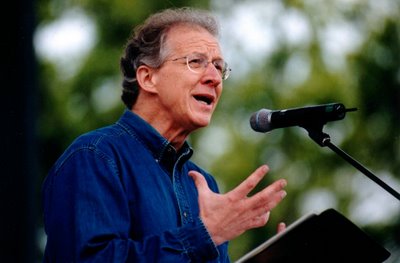 Tim Challies gets to live-blog more and more conferences. Soon it seems he will just live at a conference permanently. I have only ever done this with one conference — Together On A Mission 06. Live-blogging is simply sharing notes and reflections of the sessions. I have made it something of a tradition that I extract a few quotes from these posts. I call it “remote blogging.” Examples include Together for the Gospel 06 and Worship God 06. So here goes with this latest conference. I will report it in typical blogger’s reverse chronological order, with the newest ones at the top.
Tim Challies gets to live-blog more and more conferences. Soon it seems he will just live at a conference permanently. I have only ever done this with one conference — Together On A Mission 06. Live-blogging is simply sharing notes and reflections of the sessions. I have made it something of a tradition that I extract a few quotes from these posts. I call it “remote blogging.” Examples include Together for the Gospel 06 and Worship God 06. So here goes with this latest conference. I will report it in typical blogger’s reverse chronological order, with the newest ones at the top.
Resolved Conference (Reflections)
Tim reflects on the conference in this post, and he seems pretty pleased. The following stood out to me:
“Steve Lawson is one of the most talented expositors (and truthfully, perhaps the most talented expositor) of Scripture I’ve ever had the privilege of hearing. When I take notes for his sermons, I often end up with 2,500 words or more. His teaching just resonates within my heart and mind.
C. J. Mahaney has an amazing ability to draw deeply personal application. He never finishes a sermon without prodding the listener to examine his heart and to live a more godly life.
John MacArthur is an excep-tional teacher and potentially the most skilled Bible teacher I’ve heard. His knowledge and understanding of Scripture is almost unmatched.
John Piper has the amazing ability to pursue theology to the ultimate. He pursues doctrine and theology far beyond the surface, and does not quit until he has traced it to its deepest purpose, deepest meaning, and deepest application.
As for Rick Holland . . . well, unfortunately I have only heard him speak one time so have little knowledge of his teaching ministry. However, from what was evident at the conference, he is a talented leader and one who garners the love and respect of those who serve with him. His desire to communicate deeply and personally with young Christians is obvious, and his ability in doing this is shown in the lives of the young people who have been impacted by his ministry.”
 The preacher in me was relieved that even the greats can get carried away and either not have time to finish their material or quite simply forget! I was somehow greatly encouraged by the following paragraph! So much so, that for material from the talk itself you are going to have to go visit Tim!
The preacher in me was relieved that even the greats can get carried away and either not have time to finish their material or quite simply forget! I was somehow greatly encouraged by the following paragraph! So much so, that for material from the talk itself you are going to have to go visit Tim!
“Piper began by completing his address from the night before since he had forgotten the fifth point. Point five should have been that there is no gospel unless everything else gets you to God to enjoy Him forever. The other four won’t be the gospel if there is no God to enjoy. This is why a lot of people think they are Christians when they are not. We need to get through the benefits of the gospel to the main benefit of the gospel. The main verse for last night’s talk (1 Peter 3:18) had somehow never been referenced.”
C. J. spoke on 1 Corinthians 4. The following was what I noticed most from Tim’s report:
“Grace, he said, prepares us for suffering (verses 8-13). The Corinthians were not prepared for this paradox.
They considered themselves as already having arrived spiritually (see the two repetitions of “already”). Paul was going to introduce them to a new category: the “not yet.” The nature of the Christian life takes into account “the already,” but also the “not yet.” Already there is regeneration, forgiveness, and so on, but there is also the category of the “not yet” for the reality of sin and suffering and death remains. The Corinthians only had one category: “the already.” They felt they already had what they needed and all they would have. Paul, though, redefines spirituality for them. He informs them of the harsh reality of suffering.”
Tim Challies begins his report of Piper’s talk by a puzzling admission that I have heard before—that he finds Piper hard to grasp. Other people I have spoken to have said a similar thing at times. I believe, though, that Piper is well worth any extra effort required.  In the meantime, what advice would I give to any who feel similarly? First, pray like mad and ask God to deal with any spiritual deadness that may remain, and to send His Spirit of revelation. Then get a hold of some of Piper’s mp3s and try listening rather than reading. Finally, read his books very slowly—if necessary a few lines at a time. If all else fails, there’s an easy answer. Get a copy of Sam Storm’s One Thing which is a great easy-to-read introduction to many of the concepts that he shares with Piper.
In the meantime, what advice would I give to any who feel similarly? First, pray like mad and ask God to deal with any spiritual deadness that may remain, and to send His Spirit of revelation. Then get a hold of some of Piper’s mp3s and try listening rather than reading. Finally, read his books very slowly—if necessary a few lines at a time. If all else fails, there’s an easy answer. Get a copy of Sam Storm’s One Thing which is a great easy-to-read introduction to many of the concepts that he shares with Piper.
Tim explains that Piper spoke about five stages of the Gospel:
“There are five elements to the gospel. First, there is an event (1 Corinthians 15:3) – the crucifixion of Christ. There must have happened in history this event for without it there is no gospel. The event is, of course, Jesus’ death and resurrection. Second, the achievement of His death objectively outside of you. For example, the wrath of God absorbed for all the elect. The curse for our sin is averted by Christ. Third, the free offer. With no event and achievement there can be no offer. It is offered freely by faith alone. Fourth, the application of this in your experience. You must experience reconciliation, forgiveness, justification, and so on. For the gospel to be gospel to you, you must experience these things. And fifth? Well, I don’t think he ever got to the fifth.”
So anyone else who was there—did Piper get to his fifth element of the gospel and if so what was it? I remember from my reading of Piper’s book God is the Gospel (on which this talk was based) him saying, “The gospel is not a way to get people to heaven; it is a way to get people to God.”
Unless I am mistaken, that is the place where Piper would have been leading us.
Steve Lawson spoke on Luke 14:25-33 with the topic “The Cost of Discipleship (It Will Cost You Everything).” Here are some quotes that stood out to me:
“Jesus never tried to induce the crowd to follow Him or to call people to make quick and easy decisions. He never softened the requirements.”
“In order to become a true follower of Jesus Christ, one must love Him more than anyone or anything. There must be no competing allegiances. Following Jesus requires a lifetime, ongoing decision to do this. It is not a one-time decision or a one-time act. Verse 26 is the Lord’s clarification of true saving faith. “If anyone comes to me and does not hate his own father and mother and wife and children and brothers and sisters, yes, and even his own life, he cannot be my disciple.”
This session saw C. J. Mahaney speaking on Isaiah 53. He died as our substitute. He took our place. The following quote stands out to me:
“The language of substitution is peppered through these verses: bore, carried, wounded, crushed, chastised, stripes, and the language culminates in ‘laid on him.’ He paid the penalty I owed. While I was still in my sin, He suffered the punishment that I so justly and richly deserve. Those who are limited to human observation could conclude in verse 4 that He was stricken and smitten by God for His own sin and, in particular, the sin of blasphemy. Many who watched this drama unfold drew this conclusion. Those who have been granted new eyes realize that He was stricken by God not for His sin, but for their sin. When we look at this deformed, disfigured, suffering servant hanging in agony and suspended between heaven and earth, we must realize that He is there as our substitute receiving the punishment that we deserve.”
Session 4 — John MacArthur on Luke 18
In this session the talk from John focused on the parable of the tax collector and the Pharisee from Luke 18. I love this description:
“Their whole religious system was based on the idea that a person can make himself righteous by his own morality and religion. Pharisees were the very archetype of this righteousness, but Jesus shatters this illusion.
Jesus’ final words would have shocked the listeners. They would have been stunned. In one moment Jesus pronounces an extreme sinner righteous apart from any works, merit, worthiness, law-keeping, ritual, or ceremony. He is instantaneously justified. How can this be? We know because it unfolds in the rest of the New Testament. The key is that Jesus’ righteousness was credited to this man’s account. The sin problem was dealt with and propitiation was made. The man who pleaded for mercy was granted mercy while the man who depended on his own goodness was cast off.”
Somebody needs to explain to me how the “New Perspectives on Paul” people interpret that parable. You see, according to them, there was no problem with legalism in Jesus’ and Paul’s day. We have just caricatured the Pharisees. It seems to me that—far from Paul being the worst culprit in such a caricature—that honor would go to our Lord. Seems to me Jesus was right and the modern scholars wrong, don’t you think?
John MacArthur spoke on 1 Corinthians 1-2. His main points were as follows:
- The shameful sentence of the cross
- The shameful stigma of the cross
- The shameful simplicity of the cross
- The shameful singularity of the cross
- The shameful society of the cross
- The shameful sovereignty of the cross
Tim makes the following statement about worship: “There is less physical expression during worship than I had expected.”
llies%20011-767368.jpg” align=”left” hspace=”20″ vspace=”20″ width=”50%” />I guess he has been to a Sovereign Grace Conference. As so many of these conferences invite each other’s speakers these days, I have to wonder if the most significant difference lies in the style of worship, and as Tim puts it, the level of physical expression. I should be a good evangelical and resist the temptation to start quoting the Psalms . . . O, go on then, I’ll just mention one—Psalm 149.
Steve Lawson spoke about “The Power of the Gospel” from Hebrews 1:1-4. The following quotes from Tim’s post stuck out to me:
“No one will ever live higher than their view of God and their view of Jesus Christ.”
“The greatest sin in all of the world is the sin of unbelief—it is the sin of refusing Him who is speaking.”
Challies makes me just a little bit jealous by saying, “I began my day in the subzero temperatures of a frozen Canadian winter and ended it in balmy, eighty degree California.”
The first session seems to have focused on Jonathan Edwards.  It told the story of Edwards preaching his famous sermon, “Sinners in the Hands of an Angry God.” I either didn’t know or had forgotten that Edwards was interrupted repeatedly during the talk by howls from the congregation because of the conviction of sin they felt. It is this, more than most things, that makes me convinced that he was in a revival. These days I suspect most hearers, especially non-Christians, would not be greatly impressed by a sermon like Edward’s.
It told the story of Edwards preaching his famous sermon, “Sinners in the Hands of an Angry God.” I either didn’t know or had forgotten that Edwards was interrupted repeatedly during the talk by howls from the congregation because of the conviction of sin they felt. It is this, more than most things, that makes me convinced that he was in a revival. These days I suspect most hearers, especially non-Christians, would not be greatly impressed by a sermon like Edward’s.











